 Count of Monte Cristo, by Alexandre Dumas: Edmond Dantès, recently promoted to Captain and engaged to marry the beautiful Mercedes, is falsely accused of treason and sentenced to the island prison Château d'If. There he befriends the Abbe Faria and gains erudition and sophistication. He later escapes the prison, finds treasure, and returns to his home town in pursuit of revenge as the mysterious Count of Monte Cristo. Count of Monte Cristo, by Alexandre Dumas: Edmond Dantès, recently promoted to Captain and engaged to marry the beautiful Mercedes, is falsely accused of treason and sentenced to the island prison Château d'If. There he befriends the Abbe Faria and gains erudition and sophistication. He later escapes the prison, finds treasure, and returns to his home town in pursuit of revenge as the mysterious Count of Monte Cristo.
 Moonfleet by John Meade Falkner: Both a mystery and an adventure story, the classic Moonfleet (1898) is a tale of smuggling set among the cliffs, caves, and downs of Dorset. It is at once a well-paced account of dramatic action and a celebration of the unregainable freedoms of childhood. Falkner's feeling for history and for the topography of his Dorset setting combine with his gift for storytelling to turn Moonfleet into an historical romance of moving intensity. Moonfleet by John Meade Falkner: Both a mystery and an adventure story, the classic Moonfleet (1898) is a tale of smuggling set among the cliffs, caves, and downs of Dorset. It is at once a well-paced account of dramatic action and a celebration of the unregainable freedoms of childhood. Falkner's feeling for history and for the topography of his Dorset setting combine with his gift for storytelling to turn Moonfleet into an historical romance of moving intensity.
 The Prisoner of Zenda, by Anthony Hope (1894): The king of the fictional country of Ruritania is abducted on the eve of his coronation, and the protagonist, an English gentleman on holiday who fortuitously resembles the monarch, is persuaded to act as his political decoy in an attempt to save the situation. The Prisoner of Zenda, by Anthony Hope (1894): The king of the fictional country of Ruritania is abducted on the eve of his coronation, and the protagonist, an English gentleman on holiday who fortuitously resembles the monarch, is persuaded to act as his political decoy in an attempt to save the situation.
 Rupert of Hentzau, Anthony Hope (1898): Sequel to The Prisoner of Zenda. The story commences three years after the conclusion of Zenda. Queen Flavia, dutifully but unhappily married to her cousin Rudolf V, writes to her true love Rudolf Rassendyll. The letter is carried by von Tarlenheim to be delivered by hand, but it is stolen by the exiled Rupert of Hentzau, who sees in it a chance to return to favour by informing the pathologically jealous and paranoid King. Rupert of Hentzau, Anthony Hope (1898): Sequel to The Prisoner of Zenda. The story commences three years after the conclusion of Zenda. Queen Flavia, dutifully but unhappily married to her cousin Rudolf V, writes to her true love Rudolf Rassendyll. The letter is carried by von Tarlenheim to be delivered by hand, but it is stolen by the exiled Rupert of Hentzau, who sees in it a chance to return to favour by informing the pathologically jealous and paranoid King.
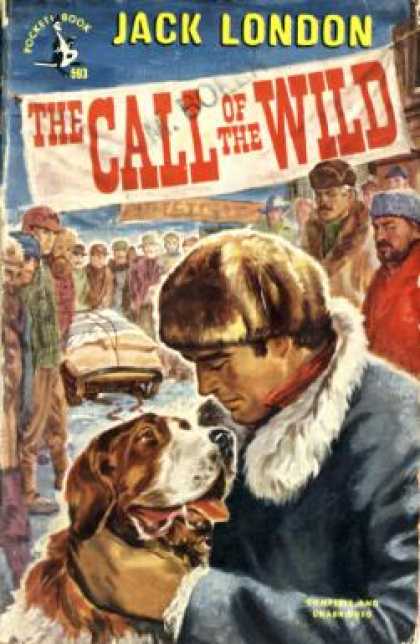 The Call of the Wild is a novel by American writer Jack London. The plot concerns a previously domesticated and even somewhat pampered dog named Buck, whose primordial instincts return after a series of events finds him serving as a sled dog in the treacherous, frigid Yukon during the days of the 19th-century Klondike Gold Rushes in which sled dogs were bought at generous prices. The Call of the Wild is a novel by American writer Jack London. The plot concerns a previously domesticated and even somewhat pampered dog named Buck, whose primordial instincts return after a series of events finds him serving as a sled dog in the treacherous, frigid Yukon during the days of the 19th-century Klondike Gold Rushes in which sled dogs were bought at generous prices.
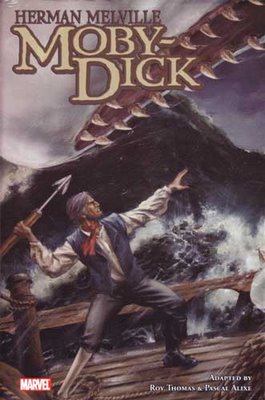 Moby-Dick (1851) by American author Herman Melville. The story tells the adventures of the wandering sailor Ishmael and his voyage on the whaleship Pequod, commanded by Captain Ahab. Ishmael soon learns that Ahab seeks one specific whale, Moby Dick, a white sperm whale of tremendous size and ferocity. Comparatively few whaleships know of Moby Dick, and fewer yet have encountered him. In a previous encounter, the whale destroyed Ahab's boat and bit off his leg. Ahab intends to take revenge. Moby-Dick (1851) by American author Herman Melville. The story tells the adventures of the wandering sailor Ishmael and his voyage on the whaleship Pequod, commanded by Captain Ahab. Ishmael soon learns that Ahab seeks one specific whale, Moby Dick, a white sperm whale of tremendous size and ferocity. Comparatively few whaleships know of Moby Dick, and fewer yet have encountered him. In a previous encounter, the whale destroyed Ahab's boat and bit off his leg. Ahab intends to take revenge.
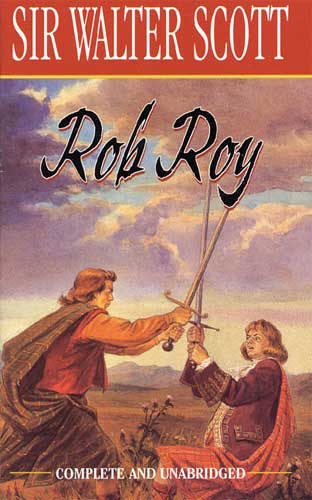 Rob Roy (1817) is a novel by Walter Scott about Frank Osbaldistone, the son of an English merchant who goes to the Scottish Highlands to collect a debt stolen from his father. Frank's cousin, Rashleigh, steals important documents vital to the honour of Frank's father, and Frank pursues Rashleigh to Scotland. There he meets Robert Roy MacGregor, an associate of Diana's father. Rob Roy (1817) is a novel by Walter Scott about Frank Osbaldistone, the son of an English merchant who goes to the Scottish Highlands to collect a debt stolen from his father. Frank's cousin, Rashleigh, steals important documents vital to the honour of Frank's father, and Frank pursues Rashleigh to Scotland. There he meets Robert Roy MacGregor, an associate of Diana's father.
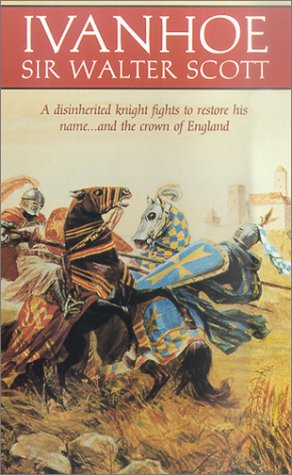 Ivanhoe is a novel by Sir Walter Scott. The Saxon protagonist, Wilfred of Ivanhoe, is Sir Wilfred of Ivanhoe is disinherited by his father Cedric of Rotherwood, for supporting the Norman King Richard and for falling in love with the Lady Rowena, Cedric's ward and a descendant of the Saxon Kings of England. Cedric had planned to marry her to the powerful Lord Aethelstane, pretender to the Saxon Crown. When Wilfrid returns to England after the Crusades, he has to deal with Lord Aethelstane and the evil Knight Templar Brian de Bois-Guilbert. King Richard is said to be still in the hands of his enemies, but Wilfrid gets some help from noble outlaw Robin Hood and his Merry Men, and a mysteries Black Knight. Ivanhoe is a novel by Sir Walter Scott. The Saxon protagonist, Wilfred of Ivanhoe, is Sir Wilfred of Ivanhoe is disinherited by his father Cedric of Rotherwood, for supporting the Norman King Richard and for falling in love with the Lady Rowena, Cedric's ward and a descendant of the Saxon Kings of England. Cedric had planned to marry her to the powerful Lord Aethelstane, pretender to the Saxon Crown. When Wilfrid returns to England after the Crusades, he has to deal with Lord Aethelstane and the evil Knight Templar Brian de Bois-Guilbert. King Richard is said to be still in the hands of his enemies, but Wilfrid gets some help from noble outlaw Robin Hood and his Merry Men, and a mysteries Black Knight.
|
|
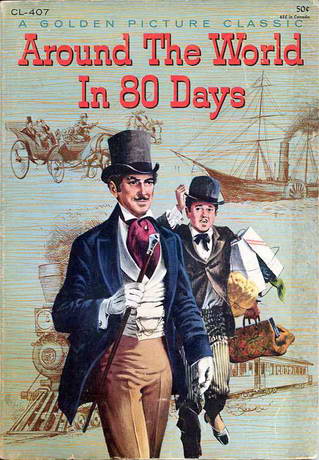 Around the World in Eighty Days is a classic adventure novel by the French writer Jules Verne, first published in 1873. In the story, Phileas Fogg of London and his newly employed French valet Passepartout attempt to circumnavigate the world in 80 days on a £20,000 wager set by his friends at the Reform Club. But there's an unexpected hitch in the form of Fix, a Scotland Yard detective, who mistakenly thinks Fogg is a bank robber. Around the World in Eighty Days is a classic adventure novel by the French writer Jules Verne, first published in 1873. In the story, Phileas Fogg of London and his newly employed French valet Passepartout attempt to circumnavigate the world in 80 days on a £20,000 wager set by his friends at the Reform Club. But there's an unexpected hitch in the form of Fix, a Scotland Yard detective, who mistakenly thinks Fogg is a bank robber.
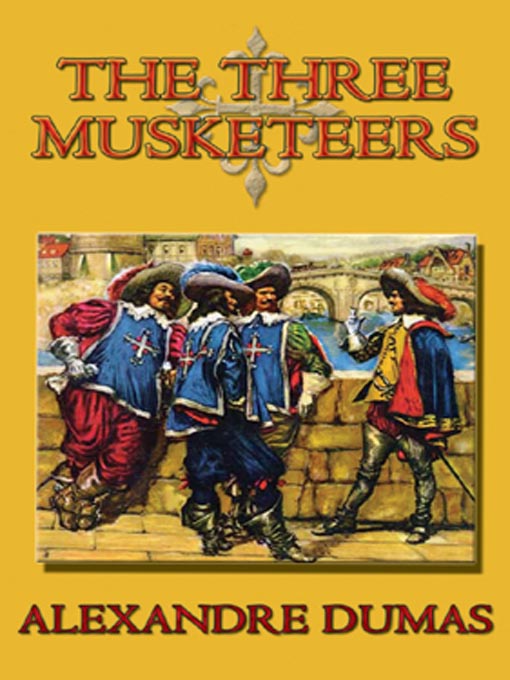 The Three Musketeers (French: Les Trois Mousquetaires) is a novel by Alexandre Dumas, père. It recounts the adventures of a young man named d'Artagnan after he leaves home to become a guard of the musketeers. But on the way, D'Artagnan goes head to head with the three musketeers—Athos, Porthos, and Aramis—inseparable friends who live by the motto "all for one, one for all". The Three Musketeers (French: Les Trois Mousquetaires) is a novel by Alexandre Dumas, père. It recounts the adventures of a young man named d'Artagnan after he leaves home to become a guard of the musketeers. But on the way, D'Artagnan goes head to head with the three musketeers—Athos, Porthos, and Aramis—inseparable friends who live by the motto "all for one, one for all".
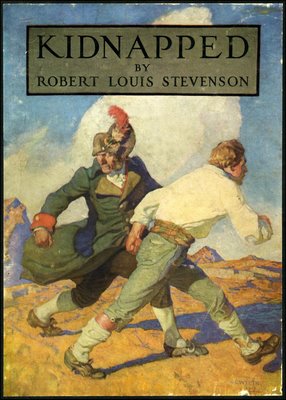 Kidnapped, by Robert Louis Stevenson: David Balfour, whose parents have recently died and who is out to make his way in the world, goes to the House of Shaws in Cramond, where his uncle, Ebenezer Balfour, lives. He soon discovers evidence that his father may have been older than his uncle, thus making himself the rightful heir to the estate. But before David can investigate further, his uncle has him kidnapped and put aboard a ship bound for the Carolinas. On ship he meets Alan Breck Stewart, a Jacobite who supports the claim of the House of Stuart to the throne of Scotland, and the two embark on a series of adventures. Kidnapped, by Robert Louis Stevenson: David Balfour, whose parents have recently died and who is out to make his way in the world, goes to the House of Shaws in Cramond, where his uncle, Ebenezer Balfour, lives. He soon discovers evidence that his father may have been older than his uncle, thus making himself the rightful heir to the estate. But before David can investigate further, his uncle has him kidnapped and put aboard a ship bound for the Carolinas. On ship he meets Alan Breck Stewart, a Jacobite who supports the claim of the House of Stuart to the throne of Scotland, and the two embark on a series of adventures.
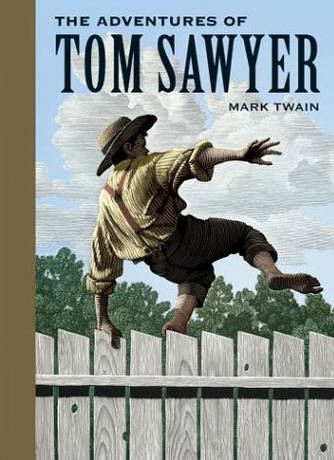 Tom Sawyer, by Mark Twain: An imaginative and mischievous twelve-year-old boy named Thomas Sawyer lives with his Aunt Polly and his half-brother, Sid, also known as Sidney, in the Mississippi River town of St. Petersberg, Missouri. He visits the graveyard at night with Huckleberry Finn, the son of the town drunk and witnesses the murder of young Dr. Robinson by the Native American “half-breed” Injun Joe. Scared, Tom and Huck run away. Injun Joe blames his companion, Muff Potter, a hapless drunk, for the crime. Tom has to decide whether to let an innocent man die or come out and bear witness. Tom Sawyer, by Mark Twain: An imaginative and mischievous twelve-year-old boy named Thomas Sawyer lives with his Aunt Polly and his half-brother, Sid, also known as Sidney, in the Mississippi River town of St. Petersberg, Missouri. He visits the graveyard at night with Huckleberry Finn, the son of the town drunk and witnesses the murder of young Dr. Robinson by the Native American “half-breed” Injun Joe. Scared, Tom and Huck run away. Injun Joe blames his companion, Muff Potter, a hapless drunk, for the crime. Tom has to decide whether to let an innocent man die or come out and bear witness.
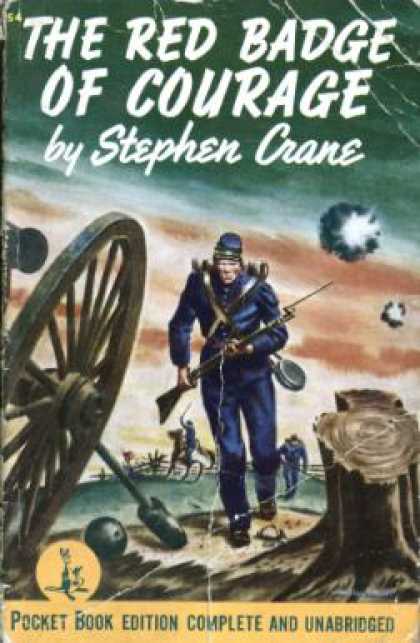 The Red Badge of Courage is an 1895 war novel by American author Stephen Crane. During an unnamed conflict of the American Civil War, 18-year-old private Henry Fleming deserts his battalion, considering the battle to be a lost cause. Henry later learns that his battalion has won the battle, and feels very guilty. He returns to his battallion. The next morning Henry goes into battle for the third time, and hears an officer speaks casually about sacrificing Henry's regiment because they are nothing more than "mule drivers" and "mud diggers". The Red Badge of Courage is an 1895 war novel by American author Stephen Crane. During an unnamed conflict of the American Civil War, 18-year-old private Henry Fleming deserts his battalion, considering the battle to be a lost cause. Henry later learns that his battalion has won the battle, and feels very guilty. He returns to his battallion. The next morning Henry goes into battle for the third time, and hears an officer speaks casually about sacrificing Henry's regiment because they are nothing more than "mule drivers" and "mud diggers".
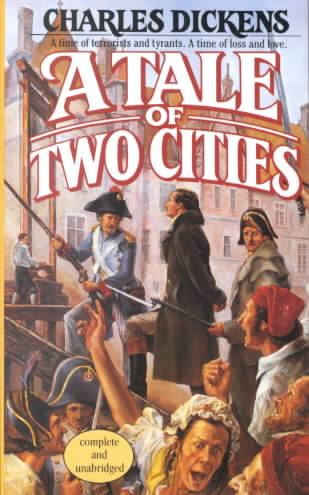 A Tale of Two Cities (1859) is a novel by Charles Dickens, set in London and Paris before and during the French Revolution. It follows the lives of several protagonists through these events, most notably Charles Darnay, a French once-aristocrat who falls victim to the indiscriminate wrath of the revolution, and Sydney Carton, a dissipated British barrister who endeavors to redeem his ill-spent life out of love for Darnay's wife, Lucie Manette. A Tale of Two Cities (1859) is a novel by Charles Dickens, set in London and Paris before and during the French Revolution. It follows the lives of several protagonists through these events, most notably Charles Darnay, a French once-aristocrat who falls victim to the indiscriminate wrath of the revolution, and Sydney Carton, a dissipated British barrister who endeavors to redeem his ill-spent life out of love for Darnay's wife, Lucie Manette.
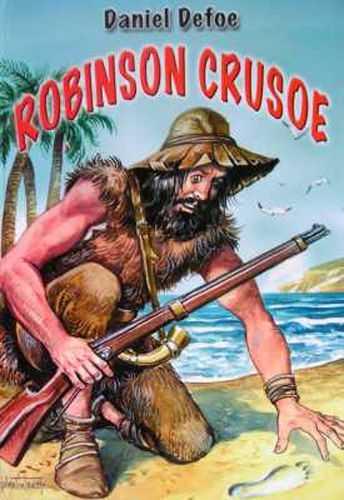 Robinson Crusoe by Daniel Defoe: Crusoe leaves England, against the wishes of his parents, who want him to stay home and assume a career in law. Years later, he is shipwrecked in a storm about forty miles out to sea on an island near the mouth of the Orinoco river on September 30, 1659. His companions all die. Having overcome his despair, he fetches arms, tools, and other supplies from the ship before it breaks apart and sinks. This is a story of how he survives on the island. Robinson Crusoe by Daniel Defoe: Crusoe leaves England, against the wishes of his parents, who want him to stay home and assume a career in law. Years later, he is shipwrecked in a storm about forty miles out to sea on an island near the mouth of the Orinoco river on September 30, 1659. His companions all die. Having overcome his despair, he fetches arms, tools, and other supplies from the ship before it breaks apart and sinks. This is a story of how he survives on the island.
Ambrotox and Limping Dick
|